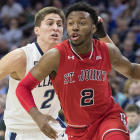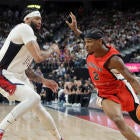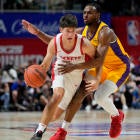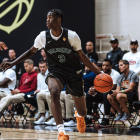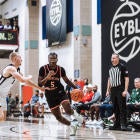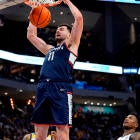There are some regular-season upsets in college basketball where you look at the result and can draw a big conclusion about the losing team.
Duke's loss to North Carolina State last month was one of those upsets. Duke gave up 96 points to N.C. State that day. Only twice this season has N.C. State scored more points than that; both were against awful low-major teams ranked below 300 on KenPom.com.
That upset pointed at the glaring weaknesses with Duke's defense that continue to today, and proved a bigger point that it's really, really hard for a team that's starting four five-star freshmen to play good team defense.
There are other regular-season upsets in college basketball where you look at the result and shouldn't draw any big conclusions at all. As Bleacher Report's Kerry Miller pointed out last night -- in the midst of No. 1-ranked Villanova losing to a St. John's team that was previously winless in the Big East -- the 2014-15 Wisconsin Badgers went to New Jersey in January and lost to a Rutgers team that would go 10-22 that season (and lose its next 15 games).
Big conclusions from fourth-ranked Wisconsin losing that game? Hardly. Frank Kaminsky missed that game with a concussion, then Traevon Jackson hurt his ankle and missed the second half. Wisconsin went on to the national title game that year.
This is a long-winded way of explaining that I am not at all concerned with Villanova after its shocking 79-75 home loss to a St. John's team that was 0-11 in the Big East going into the game. And that's not because I think St. John's is suddenly a good team after upsetting Duke four days ago and then Villanova on Wednesday. I don't. It was a bad loss for Villanova.
But Villanova was missing Eric Paschall with a concussion. Paschall was leading the Big East in 3-point shooting (54.8 percent), and he was one of Villanova's strongest defenders and best athletes. And guard Phil Booth has been out since Jan. 24 with a fractured bone in his right hand. That's two starters for a team that's not particularly known for its depth.
Find me another team in the country that wouldn't have a bad loss or two when they are minus two starters.
What Villanova is: an incredibly efficient scoring machine. Jay Wright's team ranks No. 1 in the nation in offensive efficiency and effective field-goal percentage. Villanova shoots 41 percent from beyond the arc (12th in the nation) and 59 percent from inside the arc (fifth in the nation). And they rarely turn the ball over; their turnover percentage ranks fourth in the nation. It's literally one of the finest offensive teams in recent college basketball memory.
On Wednesday night, they had plenty of open looks, but the shots didn't fall. Jalen Brunson, one of the best 3-point shooters in the country, went 2 for 11 from deep. Omari Spellman, Mikal Bridges and DonteDiVincenzo, all of whom were shooting 40 percent plus from 3, went a combined 2 for 16. As a team, the Wildcats shot a miserable 24.2 percent from beyond the arc. That's uncannily bad, and not likely to happen again.
The one conclusion -- a small conclusion, but a conclusion nonetheless -- is that Villanova's defense is its Achilles' heel.
Even when Villanova is perfectly healthy, this team is not an elite defensive team. It currently ranks 58th in the nation in defensive efficiency. The Wildcats are much better than that when Paschall is on the floor, but after the loss Wenesday, Wright said Paschall will be out "at least" a week.
But there are no big conclusions to draw here, folks. I got no steaming hot pile of takes for you. Yes, Villanova lost to a St. John's team that, while talented, is still a team that was 0-11 in the Big East before it came to Philly and had one of the biggest upsets of the season.
But at full strength? I still believe Villanova at full strength is one of the few -- and perhaps the only -- elite teams in college basketball this season.
And no anomalous February upset is going to change my mind on that.








